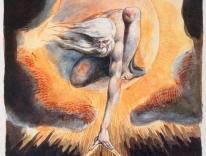“Anyone who lives in the South, who pays more than passing attention to its political, social and cultural life, cannot fail to be impressed by the persistence of a Southern identity—indeed a Southern sensibility.” So wrote Jonathan Yardley, book editor of the Greensboro, N.C., Daily News, in a recent review for the New York Times; though he was discussing works by Arna Bontemps, Nancy Price and Shirley Ann Grau, his comments apply as well to the talented Cormac McCarthy—with one revision. McCarthy’s is a Southern identity hitched to an Irish sensibility. Via the “old themes” (to use Mr. Yardley’s term) and with language as his primary tool, he has sought after a personal voice and vision. The mixture of Southern mystique and Irish trebling has not always been a comfortable one; but with Child of God, his most recent novel, he has made partial peace with some of the old ghosts, and has produced, if not a totally successful work, then one which speaks well of the future.
Cormac McCarthy’s The Orchard Keeper, an impressive, complex debut, was a recipient of the Williams Faulkner Foundation Award. Contrary to rumor, this annual prize is not bestowed upon first novels which best mimic the South’s greatest master. But to its misfortune, The Orchard Keeper bore countless comparisons to Faulkner’s novels. The story, chronicling young John Wesley’s friendship with his father’s murderer, echoes the major Faulkner themes: the criminal as hero, the interplay of language, memory and myth, and the overriding problem of survival.
To admire and emulate a master is not a fault; and the fact that Southern writers continue to be influenced by Faulkner should now be a dead issue. The Orchard Keeper suffers less from its Southern origins than from its Irish excesses. McCarthy takes an intriguing, basically linear plot, splits it into three separate strands, and, by means of a lush coating of language, gives his story an unnecessary “poetic” facade. He approaches his theme with caution, using language as a distancing element, the perfect equivalent to the novel’s narrative technique where strict chronological order is relinquished for a mistier interweaving of events. Ostensibly, the story takes place in the Tennessee hill country during the Depression years, but McCarthy’s prose allows little period detail to emerge. McCarthy wishes to describe rather than to relate. Everything is highly “imagined” and all natural events read like eulogies to some great Cosmic spirit.
They are gone now. Fled, banished in death or exile, lost, undone. Over the land sun and wind still move to burn and sway the trees, the grasses. No avatar, no scion, no vestige of that people remains. On the lips of the strange race that now dwells there their names are myth, legend, dust.
So ends The Orchard Keeper. But this is also its starting point. Rather than beginning with concrete detail and raising it to the level of myth, McCarthy’s style imparts a hushed mythic sense from the outset. “Torrential power” reads the quote on the cover of the paperback version of The Orchard Keeper; the phrase may aid sales but it is inaccurate. The Orchard Keeper, lacking a central dramatic tension, sings in very muted tones.
Outer Dark, McCarthy’s second novel, begins in the teeth of an incestuous affair that is thick with Gothic atmosphere. It matters little that we are in an unspecified region of the South during an unspecified period of time. The terrain is lean and uncluttered. There are few modern objects in sight, and the stage is set for the passions of a morality play. A woman bears her brother’s child; guilt ridden, the brother leaves the child in the woods, telling his sister it has died naturally and he has buried it. The sister learns that this is untrue, that the child is alive, and sets out to find it. The novel proceeds by alternating scenes depicting the separate wanderings of brother and sister. Throughout the tale, the countryside is being ravaged by three violent men. Unknown and rarely seen, they are a dim but everpresent threat.
Outer Dark is an exceptional advance over The Orchard Keeper. The language is less florid, and McCarthy squarely faces the Faulknerian overtones, thereby avoiding the suppressed violence of The Orchard Keeper. The three men who ransack and murder are a brilliant device; a mad variation on the Magi, they skim about the perimeter of the tale and eventually bring the work to its justifiable conclusion. The creation of landscape is McCarthy’s finest achievement. By some magical combination—leaving the locale unspecified but investing it with a fairy tale quality—the land has a disturbing quietude where actuality turns ever so gently into myth without sacrificing the necessary reality.
With Children of God, language is a blessing. McCarthy is not beyond an occasional flourish, as in this purplish depiction of urination: “The man stands straddlelegged, has made in the dark humus a darker pool wherein swirls a pale foam with bits of straw.” But in general the prose is pared clean:
The dumpkeeper had spawned nine daughters and named them out of an old medical dictionary gleaned from the rubbish he picked. These progeny with black hair hanging from their armpits now sat idle and wide-eyed day after day in their crates about the yard . . . Urethra, Cerebella, Hernia Sue. They moved like cats and like cats in heat attracted surrounding swains to their midden until the old man used to go out at night and fire a shotgun at random just to clear the air.
The central figure of Child of God, one Lester Ballard who rapes and murders, has provided Mr. McCarthy with the proper impetus. We instantly believe in the terror that is Lester Ballard, as we believe in the darker sides of Faulkner’s Bayard Sartoris, Joe Christmas and the evil Popeye, shadowy men who live on the periphery of society. Lester’s extravagant violence unleashes McCarthy’s dark humor. Ballard romps like a wicked elf, surprising young copulating couples in parked cars, saving the bodies of the murdered females for future acts of necrophilia. Lester, darkly mysterious, struts about the novel striking dark notes in the human condition.
Although Lester has freed McCarthy, he also becomes a hindrance. Lester is all there is to Child of God, and for all his mystery he is not enough. The novel is thinner, less full-bodied than either The Orchard Keeper or Outer Dark; this has little to do with length. Faulkner knew when to let his criminals lie still among the shadows and have the citizenry of Yoknapatawpha County capture center stage. There is no corresponding reality against which to pit Lester’s violent world. Early in the work McCarthy had interjected brief passages in which the townspeople mulled over the myth and actually of Lester Ballard, but he dropped the device quickly, to the book’s detriment. Child of God is a swift exciting read, but we are left with only incisive images strung along a thin plot line, the why and wherefore unexplained.
Child of God will perhaps be looked upon as a bad novel written by a good writer, and this would be regrettable, for Child of God marks a progression in McCarthy’s career. He has learned restraint. The “old themes” live on in him, but his South is not rendered with the precision of a realist. He has taken realism to the province of folk myth. If McCarthy can flesh out his next work while keeping a tight reign on his prose style, I believe we can expect marvelous things from this excellent writer.


